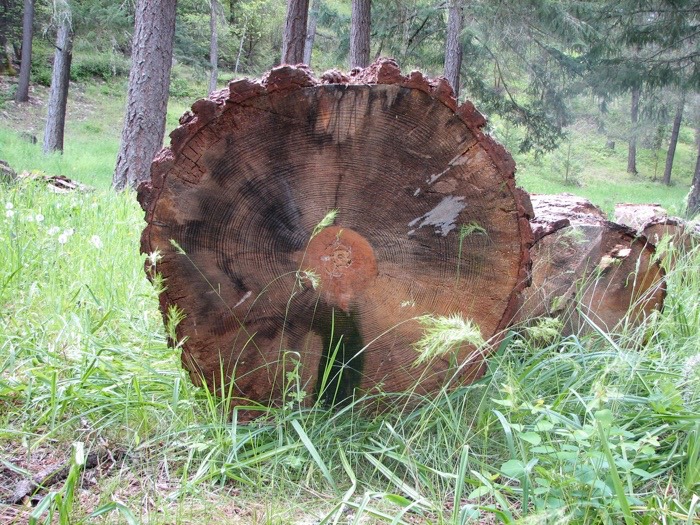Egads! A full week without a diary entry! What hath befallen BotP?
I’ve been busy with three other large projects. The first was the splitting of six tons of wood left over from a tree in our yard. Almost exactly three years ago, this tree was struck by lightning. The tree was barely 6 meters from our front door and I just happened to be looking out the window next to the front door when the lightning struck, and it was spectacular. There was an old oak stump, some 2 meters tall, right next to the pine tree (which itself was about 40 meters high). The lightning instantly boiled all the water in the trunk into steam, and the steam came shooting out the sides, blasting the oak stump (which weighed perhaps 150 kgs) about 3 or 4 meters away. There was also a decidedly orange flash of light illuminating the steam, probably from sodium.
The tree took two years to die, but die it did, and so a year or so ago we brought in a fellow to cut it down. You want a professional for a job like this because trees tend to come down where they want to come down, and in this case we didn’t want it to come down onto our house. He got it down and cut it into rounds -- slices of the tree trunk about 24 inches thick. The wood inside the tree was shattered. Some of it was “punky” — soft, almost rotten in consistency. Other sections were turned dark grey by the electricity:

The natural color of this wood is the sector at 4:00; everything else has been, to greater or lesser degree, blackened by the lightning bolt. You can also see some punky wood all around the edge, but most noticeable at 10:00.
That’s what a lightning bolt does to a tree.
Anyway, we had all this wood (about nine tons) in our front yard, so we had to split it up into firewood. We got about 3 tons of it split last Thanksgiving. Over the July 4th weekend we wanted to finish up. We rented the log splitter ($90) and worked each morning and evening. It was a huge job — some of those rounds weighed more than 100 kg! But somehow I wrestled them each into position at the log splitter and Kathy operated the controls.
That was the first big job, which is now done. The second big job, which is just starting up, involves helping the daughter of a friend with her educational project. She’s making a working version of the “turret” from the game Porthole. She’ll be out here next week and I have to get a lot of stuff prepared before her arrival. So that keeps me busy.
But I have had some time for BotP, and my problem today involves deforestation. I had set it up as a logging issue: loggers cut down timber, generating a raw material that improves industrial output, but also wiping out forests. My research indicated that I was way off the mark: most deforestation is done to generate agricultural land. So I have to rip out the pages dedicated to logging and forest area, replacing them with deforestation, which in turn should impact biodiversity and CO2 emissions.
But here’s the real problem: how is the player to affect deforestation? The only real control we have is through stronger (i.e., more expensive enforcement programs. So, do I add a new spending item to the player’s list? I don’t think so; look at how full the budget allocation controller already is:
There are five budget items and they are getting full. I simply cannot shrink this thing any further by adding another budget category. So how can I give the player a chance to influence deforestation? I have three options:
1. Leave it. Let the player experience the frustration of not being able to stop deforestation. That’s pretty much how things are in the real world.
2. Add a new tax on deforestation. The problem with this is that it’s done on the sly; we can seldom catch the culprits red-handed. If we can’t enforce laws preventing deforestation, how could we enforce taxes on it? Moreover, why wouldn’t the player tax it to the hilt? What benefit would there be in going easy on deforestation? Perhaps I could directly tie deforestation to agricultural output. After all, deforestation is done primarily to expand agricultural land. But the problem is that the actors behind deforestation are usually big landowners. They’re not making food to feed the hungry, they intend to export it to the rich world for a fat profit.
3. Revive the idea of bureaucratic intrusion: add regulations to discourage deforestation. But the same problem that plagues #2 applies here: why not choke it to death?
So I have more mulling to do.
